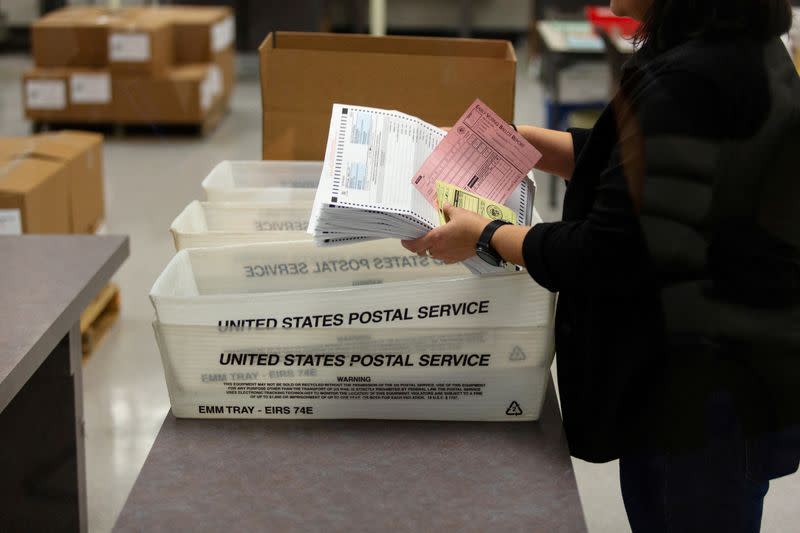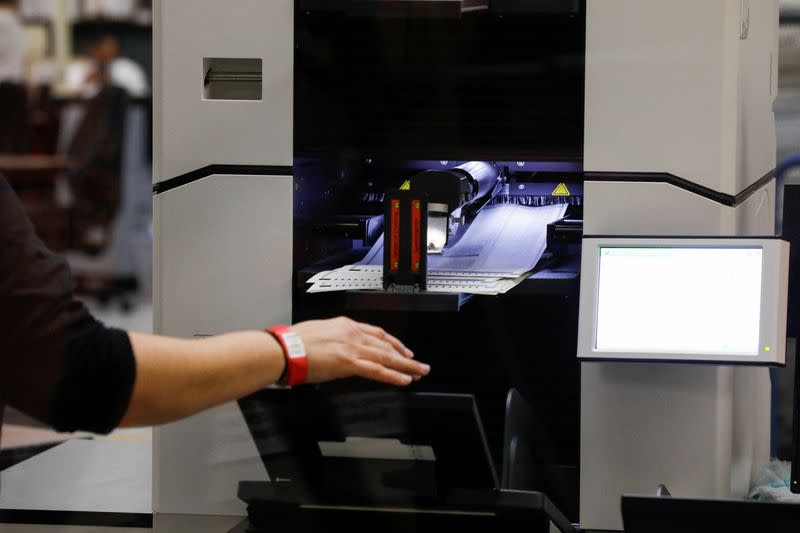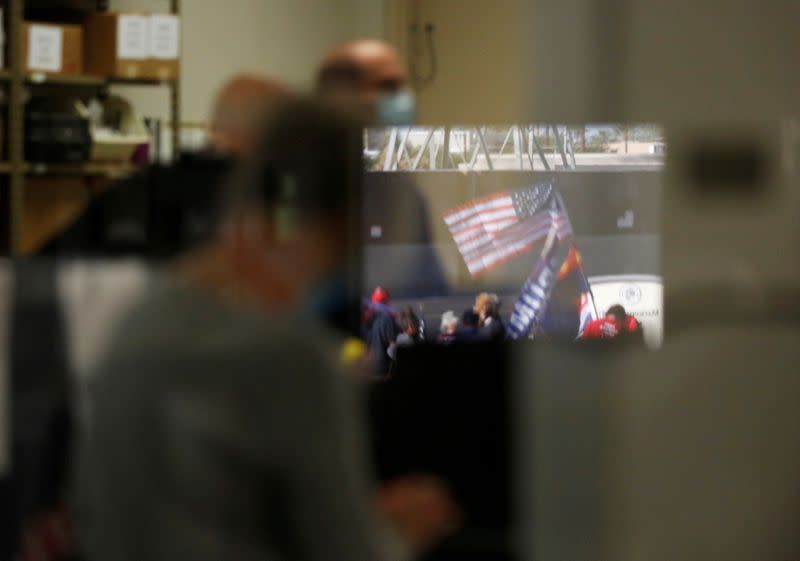'Kill them': Arizona election workers face midterm threats
By Linda So, Peter Eisler and Jason Szep
(Reuters) - Election workers in Arizona’s most fiercely contested county faced more than 100 violent threats and intimidating communications in the run-up to Tuesday’s midterms, most of them based on election conspiracy theories promoted by former President Donald Trump and his allies.
The harassment in Maricopa County included menacing emails and social media posts, threats to circulate personal information online and photographing employees arriving at work, according to nearly 1,600 pages of documents obtained by Reuters through a public records request for security records and correspondence related to threats and harassments against election workers.
Between July 11 and Aug. 22, the county election office documented at least 140 threats and other hostile communications, the records show. “You will all be executed,” said one. “Wire around their limbs and tied & dragged by a car,” wrote another.
The documents reveal the consequences of election conspiracy theories as voters nominated candidates in August to compete in the midterms. Many of the threats in Maricopa County, which helped propel President Joe Biden to victory over Trump in 2020, cited debunked claims around fake ballots, rigged voting machines and corrupt election officials.
Related video: Sheriffs increase security at Arizona ballot drop boxes
Other jurisdictions nationwide have seen threats and harassment this year by the former president’s supporters and prominent Republican figures who question the legitimacy of the 2020 election, according to interviews with Republican and Democratic election officials in 10 states.
The threats come at a time of growing concern over the risk of political violence, highlighted by the Oct. 28 attack on Democratic House Speaker Nancy Pelosi's husband by a man who embraced right-wing conspiracy theories.
In Maricopa, a county of 4.5 million people that includes Phoenix, the harassment unnerved some election workers, according to previously unreported incidents documented in the emails and interviews with county officials.
A number of temporary workers quit after being accosted outside the main ballot-counting center following the Aug. 2 primary, Stephen Richer, the county recorder who helps oversee Maricopa’s elections, said in an interview. One temporary employee broke down in tears after a stranger photographed her, according to an email from Richer to county officials. The unidentified worker left work early and never returned.
She wasn’t a political person, she told Richer. She just wanted a job.
On Aug. 3, strangers in tactical gear calling themselves “First Amendment Auditors” circled the elections department building, pointing cameras at employees and their vehicle license plates. The people vowed to continue the surveillance through the midterms, according to an Aug. 4 email from Scott Jarrett, Maricopa's elections director, to county officials.
“It feels very much like predatory behavior and that we are being stalked,” wrote Jarrett.
ATTACKS PERSISTED
Since the 2020 election, Reuters has documented more than 1,000 intimidating messages to election officials across the country, including more than 120 that could warrant prosecution, according to legal experts.
Many officials said they had hoped the harassment would wane over time after the 2020 results were confirmed. But the attacks have persisted, fueled in many cases by right-wing media figures and groups that continue without evidence to cast election officials as complicit in a vast conspiracy by China, Democratic officials and voting equipment manufacturers to rob Trump of a second presidential term.
In April, local election officials in Arizona participated in a drill simulating violence at a polling site in which several people were killed, according to an April 26 email from Lisa Marra, the president of the Election Officials of Arizona, which represents election administrators from the state's 15 counties. The drill aimed to help officials prepare for Election Day violence, and left participants “understandably, disturbed” said the email to more than a dozen local election directors.
In a statement, Marra said: "This is just one other tool we can use to ensure election safety for all."
Maricopa officials appeared at times overwhelmed by threatening posts on social media and right-wing message boards calling for workers to be executed or hung. Some messages sought officials' home addresses, including one that promised “late night visits.” Employees were filmed arriving and leaving work, according to emails among county officials.
Two days after the Aug. 2 primary election, the county’s information security officer emailed the FBI pleading for help.
“I appreciate the limitations of what the FBI can do, but I just want to underline this,” wrote Michael Moore, information security officer for the Maricopa County Recorder’s Office. “Our staff is being intimidated and threatened,” he added. “We’re going to continue to find it more and more difficult to get the job done when no one wants to work for elections.”
A special agent for the FBI acknowledged the agency’s limitations, according to the emails. “As you put it, we are limited in what we can do - we only investigate violations of federal law,” the FBI agent responded in an Aug. 4 email. Reporting threats to local law enforcement is ”the only thing I can suggest,” the agent wrote, “even if at this point it has not resulted in any action.”
The FBI declined to comment on the agent’s response to Moore. It also declined to confirm or deny the existence of ongoing investigations into the threats.
Moore did not respond to requests for comment, but Richer, his boss, said in a statement that he greatly appreciated the FBI’s partnership and vigilance. "This is an inherently emotional topic - communications of the most vile nature have been repeatedly sent to my team,” the statement said.
One anonymous sender using the privacy-protective email service ProtonMail sent “harassing emails” for almost a year, Moore, wrote in an Aug. 4 email to the FBI. One message warned Richer that he’d be “hung as a traitor.”
“I’d like to have a black and white poster in my office of you hanging from the end of a rope,” the sender wrote.
The harassment and threats were affecting the mental health of election workers, Jarrett wrote in his Aug. 4 memo. “If our permanent and temporary staff do not feel safe, we will not be able (to) recruit and retain staff for upcoming elections.”
In all, county officials referred at least 100 messages and social media posts to FBI and state counter-terrorism officials. Reuters found no evidence in the correspondence that officials saw any of the messages as breaching the expansive definition of constitutionally protected free speech and crossing into the territory of a prosecutable threat.
The U.S. Justice Department declined to comment on specific ongoing investigations but said it has opened dozens of cases nationwide involving threats to election workers. Eight people face federal charges for threats, including two who targeted Maricopa County officials.
DOJ spokesperson Joshua Stueve said that while the “overwhelming majority” of complaints the agency receives “do not include a threat of unlawful violence,” he said the messages are “often hostile, harassing, and abusive” towards election officials and their staff. “They deserve better,” Stueve said.
ONLINE INSPIRATION
Misinformation on right-wing websites and social media fueled much of the hostility towards election staff, according to the internal messages among Maricopa officials.
On July 31, the Gateway Pundit, a pro-Trump website with a history of publishing false stories, reported that a Maricopa County election official allowed a staff technician to gain unauthorized access to a computer server room, where he deleted 2020 election data that was set to be audited. The website published the names and photos of the official and the tech; readers responded with threats against both.
“Until we start hanging these evil doers nothing will change,” one reader wrote in the Gateway Pundit’s comment section. Another suggested death for the computer tech identified in the story: “hang that crook from (the) closest tree so people can see what happens to traitors.”
The tech hadn’t deleted anything, according to a Maricopa spokesperson. The county election director had instructed him to shut down the server for delivery to the Arizona State Senate in response to a subpoena. A review of server records confirmed nothing was deleted, the spokesperson told Reuters, and all data from the 2020 election had been archived and preserved months earlier.
Election employees singled out in Gateway Pundit stories “tend to see a surge in being targeted” for threats and harassing messages, Moore, the county’s information security officer, said in a Nov. 18, 2021, email to the FBI. Those stories, he added, are often “flagrantly inaccurate.” A Reuters investigation published last December found the Gateway Pundit cited in more than 100 threatening and hostile communications directed at 25 election workers in the year after the 2020 election.
Other right-wing news outlets and commentators elicited similar hostile comments in response to their allegations against Maricopa officials. In August, right-wing provocateur Charlie Kirk posted a comment in Telegram accusing Richer, the county recorder, and “his cronies” of making Arizona’s elections “a Third-World circus.”
“When do we start hanging these people for treason?” one reader commented. Another simply added, “Kill them.”
The Gateway Pundit and Kirk did not respond to requests for comment.
After a security assessment by the U.S. Department of Homeland Security in late 2021, Maricopa strengthened doors, added shatterproof film on windows and bought more first aid kits, according to the documents.
But the harassment has continued.
“This goes beyond just onsite security. It is a mental health issue,” Jarrett, the county elections director, wrote in an email to county officials two days after the primary.
“I very much respect freedom of speech and welcome public scrutiny,” Jarrett added. “However, allowing this predatory activity to occur is damaging and threatening the viability of the elections department.”
(Reporting by Linda So, Peter Eisler and Jason Szep; Editing by Suzanne Goldenberg)




